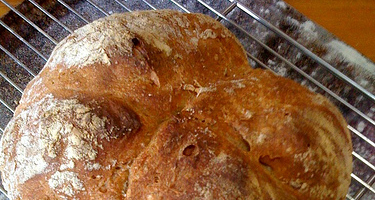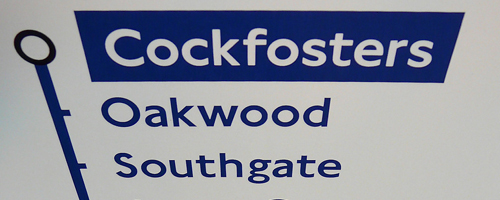
Picture by Will Merydith: Fresh Baked Bread
Toby and Lillian return to find the kitchen streamered with wires. They criss-cross and twist and loop, red and green and white and blue. They run between every appliance, from the microwave to the refrigerator; their far ends disappear into light sockets or round lumps of dough.
Nanette is standing in the middle of the tangle, apron tied loosely over her lab coat. The thickest of the cords runs from her laptop to the stove; the oven door is jammed open by what looks like a periscope. A soldering iron, a spatula and a copper-bottomed bowl sit on the countertop.
“Baked beans for dinner again?” Toby says.
“Hey, hold this,” Nanette says, and hands him an aerial. “It’ll only take a moment.” She adjusts a dial on the oven; there’s a pause, then a loud pop, then a small puff of flour from the toaster.
She frowns. “Okay, that’s getting better,” she says, and rotates the copper bowl ninety degrees.
(The Chorleywood Bread Process can transform a pile of weak flour into a sliced packaged loaf in two hundred and ninety minutes. It’s pretty fast. And, as a consequence, pretty cheap; and, as a further consequence, the process behind more than eighty percent of English loaves.
Nanette, brought up in an old-fashioned bakery in a small Suffolk town, discovered Chorleywood bread when she went to university.
“It’s… the crust!” she said, once she’d recovered enough to talk. “The crumb! People eat this? This isn’t bread, it’s a facecloth.”
Toby took a bite. “Tastes fine to me.”)
She refills the kettle and puts it carefully back in place.
“Can I go now?” Toby says.
“Not yet,” she says. “Just a sec.” She drops a new handful of flour into the toaster, splashes olive oil onto the stovetop.
(”I won’t,” Nanette said on that Thursday afternoon, “even talk about this… jar-of-shit pseudojam,” and she screwed on the lid with disgusted fingers.
“You sound like my grandma,” Toby said.
“Not that it matters how it tastes, when you’re just going to put it on this.” She took a slice between two fingers and wobbled it in the air. “You know what this is like? It’s like those gooey blob things you throw at walls, and they stick,” and she overarmed it towards the window; but it flopped off onto the ground and picked up a thin coating of hair and dust.
“Don’t do that,” Toby said, dusting it off and putting it back in the bag. “That’s my dinner.”)
This time there’s no puff of flour, but a green wire sparks, and the microwave door swings open.
“Okay guys,” Lillian says, “I’m going to the library. Have fun.”
“Hey,” Toby says, but it’s too late; Nanette pulls him a little further into the kitchen and changes the angle of the aerial.
“Maybe stand on the chair, actually?” she says.
(When she visited her parents over the break, they nodded sadly.
“Maybe we should have told you about it sooner,” her mother said, “but there’s some things you don’t want a little girl to know. But it was selfish of us; you shouldn’t have had to find out this way.”
“No, it’s all right,” Nanette said. “You were just trying to do the right thing.”
And she, too, tried to do the right thing. Petitions, home-baking, buying decent loaves and carrying them back to uni to feed to the ignorant. It was hard work. “I absolutely share,” said the head of baked goods at the local supermarket, “your feelings about top-quality bread, but you must understand that people want choice. Artisan loaves are never going to take over from good old-fashioned slice-n-bag. We all make our individual decisions about how to spend our limited incomes, and these decisions, Miss LaVarier, add up.”)
“What are you doing, anyway?” Toby says. “And are you going to clean up?”
“Okay,” Nanette says. “The Chorleywood Bread Process is evil, right? But it’s fast, and real bread takes too long.”
Toby sighs; Nanette has gone over this repeatedly, in varying stages of drunkenness.
“So what we need,” and she takes yet another handful of flour, “is a quicker way to make real bread. But that’s hard, right? Because the bread has to sit and rise and rest, you have to knead it, it all adds up.”
“I don’t know why it bothers you,” Toby says. “Nobody’s forcing you to eat anything.”
Nanette steps back and looks at the setup, frowns again, then switches two wires. “There’s an interesting parallel here,” she says, “with cryptography. Most of the codes that people use these days? You can break ‘em, you just need a really long time. Longer than a good loaf of bread. Longer than the life of the universe, usually.”
“Okay,” Toby says. “Sure.”
“But,” Nanette says, “that doesn’t mean everyone’s given up. People are working on the usual sort of cryptographic problem-solving—tricks to speed it all up, shortcuts. A bit like the Chorleywood Bread Process, right? And then, other people are working on a whole new system, and that’s what’s really going make it quicker. Quantum computing.”
Toby is a humanities student. “You know that doesn’t mean anything to me,” he says.
“Well, now’s probably not the time for a proper explanation—”
“I wasn’t asking for—”
“—but basically it’s a special kind of computer. It’s still in development, but the big important thing about a quantum computer is that it doesn’t have to do stuff in order, solve one problem then the next then the next. It can do everything at the same time.”
Toby’s arm is getting tired.
“And if we can use quantum mechanics to break a code,” Nanette continues, “why can’t we use it to bake a loaf? Don’t look in the microwave this time, you’ll collapse the waveforms.”
She twists another dial, fills the copper-bottomed bowl with water, sprinkles flour on top, dunks a cord in the mixture, and turns on the microwave. It whirrs.
“Doesn’t the physics department have laboratories for this?” Toby asks.
“No toasters. Three, two, one,” and the microwave dings. Nanette whips on the oven gloves and turns the copper bowl upside-down: startlingly, a loaf of bread drops out. She snatches up a plant-mister and covers it in spray. It looks pretty delicious.
“Wait, wasn’t that flour a moment ago?”
“Shush,” Nanette says, “don’t make any sudden noises.” She stands away from the loaf, watching. Steam rises. It trembles slightly.
The kitchen is silent.
“Has it worked?” Toby asks; and the loaf explodes, scattering into tiny tiny crumbs that hang in the air like smoke.
Nanette swears. “Basic decoherence problem,” she says. “The cryptographers have it too. Proof of concept, though, eh?” and she grins.
Toby blinks.
“That’s a pun,” she says. “Because you have to proof the bread? And proof of concept, it’s like, no, never mind. Just put on an apron. And maybe get the stepladder.”





